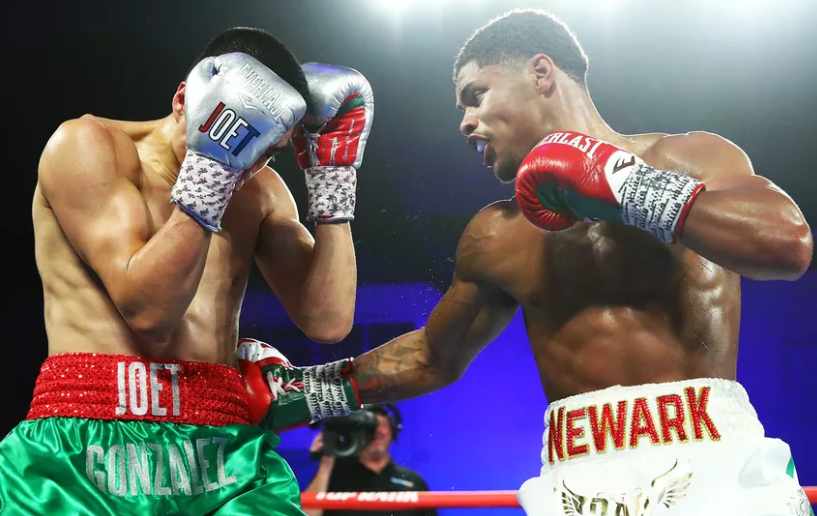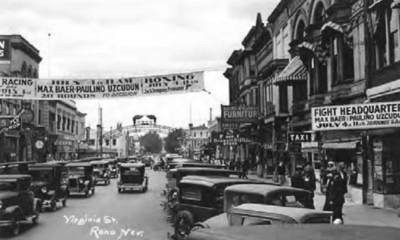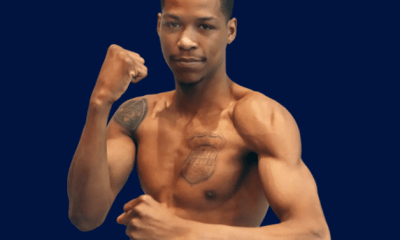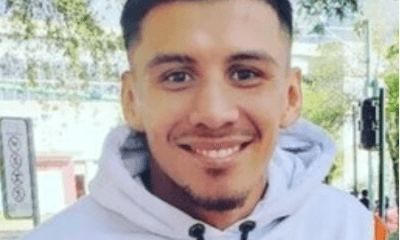Featured Articles
Avila Perspective, Chap. 89: Shakur Still Fights but California Goes Dark

Avila Perspective, Chap. 89: Shakur Still Fights but California Goes Dark
Armed with electrifying talent Shakur Stevenson looks to prove he can attract fans too when he defends the WBO featherweight title on Saturday. No fans will be allowed inside the arena but can watch via streaming or television. (Editor’s Intrusion: SIX HOURS AFTER THIS STORY WAS PUBLISHED, TOP RANK SENT WORD THAT THE EVENT WAS CANCELLED. THE TOP RANK SHOW ON ST. PATRICK’S DAY FEATURING MICHAEL CONLAN HAS LIKEWISE BEEN CANCELLED.)
Stevenson (13-0, 7 KOs) makes his initial WBO title defense against Colombia’s Miguel Marriaga (29-3, 25 KOs) at Madison Square Garden on Saturday, March 14. ESPN will show his first defense since a one-sided but safety-first performance.
Fans never like safety first fights.
Prizefighting is all about entertainment and boxing fans tend to spend money on those who take chances. The last time Stevenson entered the boxing ring he hit and moved like his amateur pedigree taught him. But amateur style boxing doesn’t sell.
Stevenson gets another opportunity to prove he can sell against Marriaga, a no-nonsense fighter who looks to take your head off every time he fights.
The Newark-based Stevenson has talent in abundance and could very well go on to win world titles in multiple weight divisions. It’s all about learning the pro fight game and that can take a short while if he learns.
Top Rank has top notch matchmakers but they can’t force Stevenson to be more offensive. Though he does have seven knockout wins that was against less dangerous opposition.
Against Joet Gonzalez (pictured covering up on the left) he promised a knockout but then did the opposite. Stevenson has the talent to do much more than stick and move to oblivion. He’s a southpaw with speed and pop and seems to have a decent chin.
Marriaga will test Stevenson to a certain degree.
The semi-main event stars former super bantamweight world champion Jessie Magdaleno (27-1) against Sakaria Lukas (23-0, 16 KOs) of Namibia in a 10-round clash at featherweight. It’s Lukas first fight outside of Africa.
Magdaleno, 28, has back-to-back wins over Rico Ramos and Rafael Rivera since losing the WBO title to Isaac Dogboe in April 2018.
California Cancels All Combat Sport Events for March
All boxing and MMA events have been canceled in California until the end of March, said Andy Foster, Executive Director for the California State Athletic Commission.
A number of boxing and MMA cards were scheduled to take place beginning this week and a large boxing card at the Inglewood Forum was planned for March 28 and at the Avalon Theater on March 29. All of the events will not take place.
Foster said the cancellations were following the direction of Governor Gavin Newsom.
Friday on Showtime
Blue-chip prospect Brandun Lee (18-0, 16 KOs) meets Camilo Prieto (15-2, 9 KOs) in the main event on Friday March 13, at Hinckley, Minnesota. Showtime will televise the welterweight clash set for 10 rounds.
Lee, 20, fights out of the California desert community of La Quinta, near Palm Springs. Though he was raised there he has mostly fought everywhere but California. It’s a strange journey for someone raised in California. In the last two years no fight has gone longer than two rounds.
“Brandun is from my area so I follow him from afar and I really admire his game. He’s undefeated and that’s not surprising at all,” said Timothy Bradley, former super lightweight world champion from Palm Springs. “I believe Lee has the goods to become a world champion and at this point he is still gaining experience and momentum towards his dream.”
Prieto, 33, fights out of Florida and has not tasted defeat in three years despite fighting out of the country his entire career.
PBC in Maryland
Big hitting James Kirkland (34-2, 30 KOs) meets Marcos Hernandez (14-3-1, 3 KOs) of Riverside, California in the main event on Saturday March 14. FOX will televise the middleweight fight live.
Kirkland has faced many of the best middleweights around including Saul “Canelo” Alvarez and Alfredo Angulo. How much does he have left?
Hernandez shown a resilient chin, but can he match blows with Kirkland?
It’s an interesting match-up. (Editor’s Note: Since this story was published, this event has been cancelled.)
Fights to Watch
Fri. Showtime 7 p.m. Brandun Lee (18-0) vs Camilo Prieto (15-2).
Fri. Telemundo 11:35 p.m. Adrian Curlier (15-3) vs Hugo Guarneros (16-3-2).
Sat. ESPN 6 p.m. Shakur Stevenson (13-0) vs Miguel Marriaga (29-3).
Tues. ESPN3 6 p.m. Michael Conlan (13-0) vs Belmar Preciado (20-2-1); Mikaela Mayer (12-0) vs Melissa Hernandez (23-7-3).
Photo credit: Mikey Williams / Top Rank
Check out more boxing news on video at The Boxing Channel
To comment on this story in The Fight Forum CLICK HERE
-

 Featured Articles3 weeks ago
Featured Articles3 weeks agoAvila Perspective, Chap. 330: Matchroom in New York plus the Latest on Canelo-Crawford
-

 Featured Articles2 weeks ago
Featured Articles2 weeks agoVito Mielnicki Jr Whitewashes Kamil Gardzielik Before the Home Folks in Newark
-

 Featured Articles4 weeks ago
Featured Articles4 weeks agoOpetaia and Nakatani Crush Overmatched Foes, Capping Off a Wild Boxing Weekend
-

 Featured Articles3 weeks ago
Featured Articles3 weeks agoCatching Up with Clay Moyle Who Talks About His Massive Collection of Boxing Books
-

 Featured Articles4 weeks ago
Featured Articles4 weeks agoFabio Wardley Comes from Behind to KO Justis Huni
-

 Featured Articles2 weeks ago
Featured Articles2 weeks agoMore Medals for Hawaii’s Patricio Family at the USA Boxing Summer Festival
-

 Featured Articles3 weeks ago
Featured Articles3 weeks agoThe Shafting of Blair “The Flair” Cobbs, a Familiar Thread in the Cruelest Sport
-

 Featured Articles3 weeks ago
Featured Articles3 weeks agoRichardson Hitchins Batters and Stops George Kambosos at Madison Square Garden






















